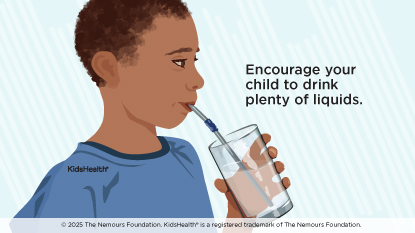Your child was vomiting (throwing up) and stayed in the hospital for treatment and testing. The health care team gave your child fluids (either by mouth or through an intravenous, or IV line) to replace the losses from vomiting. They also checked your child for different causes of vomiting. Your child is no longer vomiting and is drinking well. No serious cause of the vomiting was found. You can now care for your child at home.



Your child:

Your child:
You know your child best. If they seem very sick or have symptoms that worry you, call your health care provider or take them to the ER.

How can we prevent viruses that cause vomiting from spreading? To help prevent the spread of viruses and other germs, teach all family members to wash their hands well and often. They should wash for at least 20 seconds with soap and water. Clean tabletops, doorknobs, and other hard surfaces with a cleanser that kills viruses. Keep your child out of childcare, school, and activities until 24 hours have passed with no vomiting.
Why does vomiting happen in kids? Vomiting in kids is often caused by a virus. The viral infection may also cause diarrhea and fever. Vomiting also can happen from food allergies, food poisoning, gastroesophageal reflux (when liquids from the stomach flow backward up into the mouth), or very rarely, a blockage in the intestines.
Does my child need an antibiotic? Since viruses are the usual cause of vomiting in kids, an antibiotic won't help your child. Antibiotics treat infections caused by bacteria, not viruses.